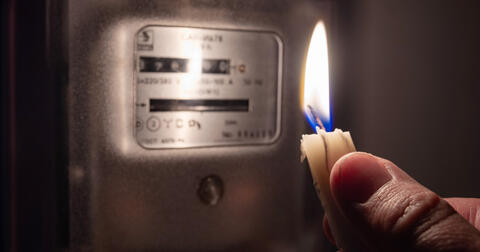Electricity System Operator Predicts Energy Shortage This Summer
Controlled blackouts are possible, officials warn
A push by electric utilities to shift away from coal and nuclear power toward solar and wind could result in electricity supply shortages and blackouts this summer, according to industry insiders.
The publication Utility Dive reports that the Midcontinent Independent System Operator, which oversees the power grid for 15 states and the Canadian province of Manitoba, anticipates trouble. MISO expects peak demand this summer to reach 124 gigawatt-hours but notes that only 119 gigawatt-hours is expected to be available. The organization is working with member companies to prepare for worst-case scenarios, Utility Dive says. In a statement, the system operator said Midwestern utilities may need to buy electricity from outside the region and impose controlled blackouts on customers.
Plans by Consumers Energy to shut down coal plants, and recent actions by another company, Entergy, to shut down the Palisades Nuclear Plant could exacerbate these predicted shortfalls. Entergy, the company that operates the Palisades plant, announced in 2017 that it intended to close the plant. The last day for the plant to generate electricity was initially targeted to be May 31. That day came 11 days early due to a mechanical issue, however. This represents a loss to the state of 811 megawatts of generation capacity. Palisades generated over 7 million megawatt-hours of electricity in 2021.
Consumers Energy, a state-regulated monopoly utility that offers services to approximately 6.6 million customers throughout the state, has asked the Michigan Public Service Commission for permission to close its last remaining coal-fired plant, Campbell Units 1-3, by 2025. Consumers’ current plan — previously approved by the state — calls for using the 1,560 MW facility until 2039, when its expected life cycle is completed. The company expects to replace the Campbell facility with natural gas, renewable energy sources such as wind and solar, and battery backup.
California and Texas produce more electricity from renewable sources than any other state, according to the Energy Information Administration. But they are also known for their rolling blackouts, having the most in the nation between 2008 and 2017, according to Statista.com.
Consumers said it is not concerned about similar outages in Michigan:
“Consumers Energy has prepared for this summer, and we are confident we have a reliable supply of energy to serve our customers,” Katie Carey, Consumers’ director of external relations, said in an email to Michigan Capitol Confidential. “MISO is looking at its entire 15-state footprint, and we will answer the call if they ask us and other energy providers to take any actions on the hottest summer days. That includes ensuring our power plants are running at full capacity and being ready to ask large industrial customers to use less energy. If necessary, that also includes asking all customers to voluntarily reduce energy use – which has not happened in a decade. We trust MISO to assess how energy resources across the entire region compare to past years.”
DTE Energy, one of Michigan’s other large monopoly utilities, serves 2.2 million customers in Southeast Michigan. It had a “critical peak event” on May 20, according to the company’s Facebook page. Utilities are required by state regulators to notify customers in advance if they anticipate reaching the limits of their electricity generation capacity and need customers to use less electricity.
One DTE customer reported receiving an email notification from the company. It read, “DTE Smart Currents Alert: Today, May 20 from 3pm to 7pm will be a Critical Peak Event. Critical Peak Pricing will be in effect. Your thermostat will be adjusted by 4 degrees to help you maximize your savings. Questions? Call 888.871.0348 Start: May 20, 2022 3:00 pm Stop: May 20, 2022 7:00 pm.”
Customer rates increase during a critical peak event from 13.99 cents per kilowatt hour to 95 cents per kilowatt hour, according to DTE’s website. Like Consumers, DTE is moving toward an emphasis on renewable energy sources. The company did not respond to an email seeking comment on the May 20 critical peak event.
Michigan Capitol Confidential is the news source produced by the Mackinac Center for Public Policy. Michigan Capitol Confidential reports with a free-market news perspective.

